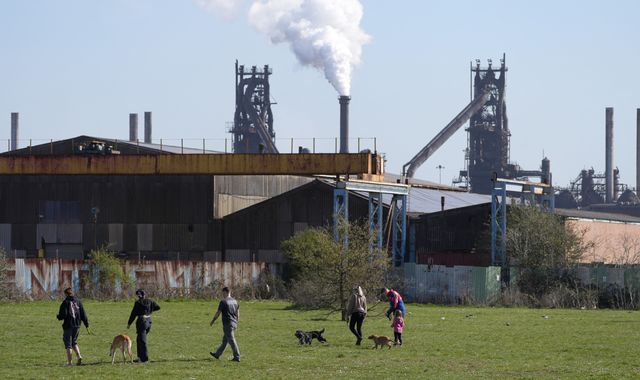
Rob Powell, political correspondent
Apr 11
A remarkable step by the government - and Donald Trump, China and Reform UK have all played their part
The law that parliament will almost certainly approve this weekend hands the business secretary the powers to direct staff at British Steel, order raw materials and, crucially, keep the blast furnaces at the plant open. This is not full nationalisation. But it is an extraordinary step. The Chinese firm Jingye will - on paper - remain the owner of British Steel. But the UK state will insert itself into the corporate set-up to legally override the wishes of the multinational company. A form of martial law invoked and applied to private enterprise. That will come at a cost to the taxpayer. Follow latest: Live politics updates No number has been specified, but there are wages to pay and orders to make at a site estimated to already be losing £700,000 a day. There is also clear frustration in government at how the Chinese owners have engaged in negotiations around modernising the Scunthorpe site. "Jingye have not been forthright throughout this process", said the business secretary in his department's official announcement about the new laws. Time is so tight because of the nature of the steel-making process. Once switched off, blast furnaces are very hard to turn back on. If this had happened in Scunthorpe - as seemed likely in a matter of days - then it would have been game over. This move keeps the show on the road and opens up more time for talks over the long-term future of the plant. While the official line in Whitehall is that "all options are on the table", nationalisation seems increasingly likely. That would need more legislation, if it was done - as seems likely - without the approval of the current owner. Finding an alternative commercial partner has not been ruled out, but one is not waiting in the wings either. As for what that long-term future looks like, with just five years of life left in the Scunthorpe blast furnaces, modernisation is inevitable. Port Talbot's plant saw its blast furnaces closed last year amid a switch to the more environmentally friendly electric arc furnaces and a loss of thousands of jobs. Political figures in Wales are now questioning why nationalisation wasn't on the table for this site. The response from government is that the deal was done by the previous Tory administration and the owners of the South Wales site agreed to the terms. But there is also a sense that this decision over British Steel is being shaped by the domestic and international political context. Labour came to power promising to revitalise left-behind communities and inject a sense of pride back into places still reeling from the loss of traditional industry. With that in mind, it would be politically intolerable to see the UK's last two blast furnaces closed and thousands of jobs lost in a relatively deprived part of the country. Read more from Sky News:Michael Gove handed peerageTickets on sale for Electoral Dysfunction live showBadenoch denies supporting local coalitions Reform UK's position of pushing for full and immediate nationalisation is also relevant, given the party is in electoral pursuit of Labour in many parts of the country where decline in manufacturing has been felt most acutely. The geo-political situation is perhaps more pressing though. Just look at the strength of the prime minister's language in his Downing Street address - "our economic and national security are all on the line". The government's reaction to the turmoil caused by President Donald Trump's pronouncements on tariffs and security has been to emphasise the need to increase domestic resilience in both business and defence. Becoming the only G7 nation unable to produce virgin steel at a time when globalisation appears to be in retreat hardly fits with that narrative. It would also present serious practical questions about the ability of the UK to produce steel for defence and the broader switch to green energy production. Then there is the intriguing subplot around US-China trade. While this decision is separate from discussions with the White House on tariffs, one can imagine how a UK move to wrestle control of a site of national importance from its Chinese owner might go down with a US president currently engaged in a fierce trade war with Beijing. This is a remarkable step from the government, but it is more a punctuation mark than a full answer. The tension between manufacturing and decarbonisation remains, as do the challenges presented by a global economy appearing to fragment significantly. But one thing is for sure. As a political parable about changes to traditional industry and the challenges of globalisation, the saga of British Steel is hard to beat.
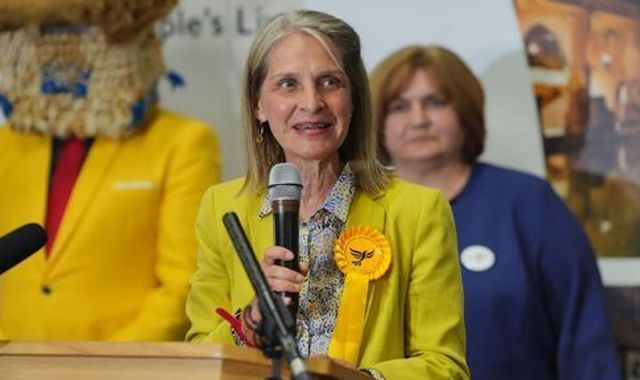
No Writer
Apr 13
Liberal Democrat MP Wera Hobhouse denied entry to Hong Kong to visit newborn grandson
Wera Hobhouse landed at Hong Kong airport on Thursday after a 13-hour flight - only to be detained by security, questioned, and put on a return flight to the UK, she told The Times. She had been due to visit her three-month-old grandson and described Chinese authorities' actions as a "cruel and upsetting blow". "My son was waiting at the other end at arrivals. I couldn't even see him and give him a hug and I hadn't seen him in a year," she told the newspaper. Ms Hobhouse is a member of the Inter-Parliamentary Alliance on China (Ipac) and has spoken out against Beijing's alleged human rights violations in both Hong Kong and Tibet. China has previously banned other Ipac members, including Sir Iain Duncan Smith and Nusrat Ghani, as well as former security minister Tom Tugendhat. Read more from Sky NewsWho are the Labour MPs rejected from Israel?Emergency bill to protect British SteelPalestinian activist can be deported Foreign Secretary David Lammy described Ms Hobhouse's experience as "deeply concerning" and says he will "urgently raise" the issues with authorities in both Hong Kong and Beijing to "demand an explanation". "It is deeply concerning to hear that an MP on a personal trip has been refused entry to Hong Kong," he said. "As I made clear earlier this week, it would be unacceptable for an MP to be denied entry for simply expressing their views as a Parliamentarian." It comes after two Labour MPs were denied entry to Israel last week. Yuan Yang and Abtisam Mohamed were suspected of planning to "document the activities of security forces and spread anti-Israeli hatred", according to the country's immigration ministry. Ms Hobhouse claimed she is the "first MP to be refused entry on arrival to Hong Kong since 1997". Her party leader Sir Ed Davey described the decision as "heartless" and "totally unacceptable".
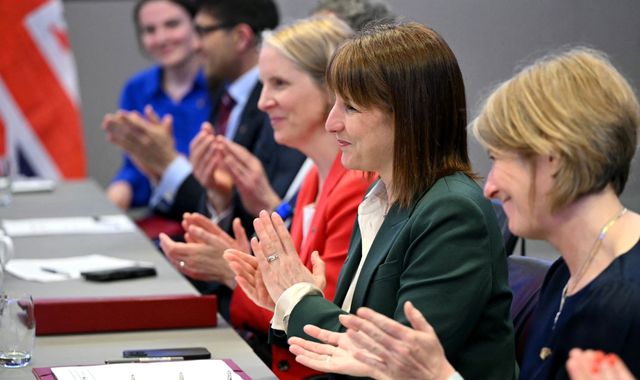
Gurpreet Narwan, business and economics correspondent
Apr 11
Some good news for the British economy - but the celebration might not last long
Output grew by 0.5% in February, up from zero growth in January and higher than the 0.1% forecast by economists. Some usual caveats apply. Monthly data can be volatile and prone to revision - but it can go up as well as down. While publishing the latest figures, the ONS also revised up its January figure from -0.1% to zero. It's clear that, across the economy, sectors performed robustly. The big surprise was manufacturing. Business surveys told us that UK factories were on their knees, anxious about Trump's tariffs and impending tax rises that came into effect in April. Yet the production sector grew by 1.5% - led by pharmaceuticals, metals and transport equipment. Businesses have been resilient. The chancellor will be pleased, but the celebrations are likely to be fleeting. The world has already moved on, with Donald Trump unleashing policy chaos on the global economy. Britain is now facing a 10% tariff on exports to the US and there will be pockets of acute stress, particularly for our car manufacturers, who have been hit with a 25% tariff. They export more to the US than any other country in the world. Indeed, some of the growth in manufacturing may have been driven by businesses rushing to do deals before tariffs came into force. The tariffs alone on the UK will be painful - but the most significant damage is likely to come from a slowdown in the global economy. The US and China are engaged in a tit-for-tat trade war and that will have negative spillovers, especially for an open economy like ours. We won't escape the fallout. Businesses here in the UK might curtail hiring and investment in response, their hesitancy compounded by uncertainty over what Donald Trump might do next. Consumers may also retreat, especially if the pound weakens and imports become more expensive, causing inflationary consequences. So, while we've finally been given something to cheer, darker days beckon. We should enjoy it while it lasts.
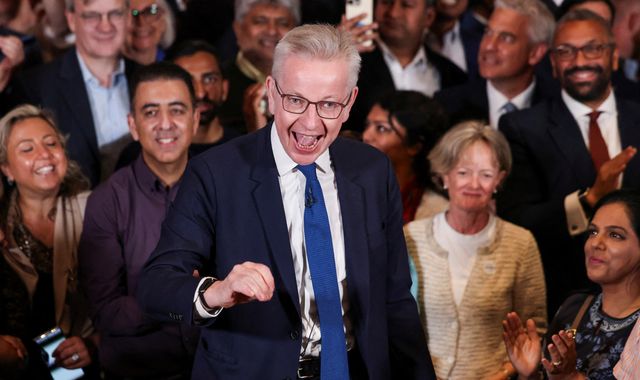
Ben Bloch, political reporter
Apr 11
Michael Gove handed peerage - as Jeremy Hunt and cricketer James Anderson knighted
Mr Gove - now editor of The Spectator magazine - was first elected to parliament in 2005 and immediately joined then-Conservative leader David Cameron's shadow cabinet. He was appointed education secretary when the party entered government in 2010 and held multiple cabinet posts until the 2024 general election, when he stood down from parliament. Mr Sunak elevated seven allies to the House of Lords, including former cabinet ministers Mark Harper, Victoria Prentis, Alister Jack, and Simon Hart. Former chief executive of the Conservative Party, Stephen Massey, also becomes a peer, as well as Eleanor Shawcross, former head of the No10 policy unit. He also awarded a number of honours. It is traditional for prime ministers to award peerages and other gongs upon their resignation from office - with key political allies, donors and staff often rewarded. An outgoing prime minister can request that the reigning monarch grants peerages, knighthoods, damehoods or other awards in the British honours system to any number of people. In the case of peerages, the House of Lords Appointments Commission vets the list, and for other honours, the Cabinet Office conducts checks. Resignation honours are separate from dissolution honours, which are awarded by the incumbent prime minister and opposition leaders after the dissolution of parliament preceding a general election. Here are the biggest names given honours by Mr Sunak: Michael Gove - peerage From when the Conservatives returned to government in 2010, Michael Gove spent almost the whole time in a ministerial role. After reforming the education system, he went on to hold roles like chief whip, environment secretary, justice secretary and housing secretary. He led the pro-Brexit side of the 2016 referendum alongside Boris Johnson, and famously sunk the latter's leadership bid with his own. However, both failed at that juncture, and Mr Gove's reputation never recovered to allow him another go at the top job. The debt was repaid when Mr Johnson fired Mr Gove as his administration collapsed in 2022. Mr Gove returned to government under Rishi Sunak, and ultimately retired from the Commons at the 2024 election. James Anderson - knighthood One of England's most successful cricketers, Jimmy Anderson, has been awarded a knighthood in avid cricket fan Rishi Sunak's resignation honours list. He is regarded as one of the greatest bowlers in the history of the sport, and holds the record for the most wickets taken by a fast bowler in Test cricket. Jeremy Hunt - knighthood A former chancellor and serial runner-up in Tory leadership competitions, Jeremy Hunt was ever present in Conservative cabinets while the party was in government. He was both foreign secretary and defence secretary before failing to take over the party after Theresa May stood aside. Following a stint on the backbenches, Mr Hunt returned as chancellor under Liz Truss in a bid to stabilise markets - retaining this position under Rishi Sunak. Despite persistent speculation he was set to be ditched in favour of Claire Coutinho, Mr Hunt kept his job until the 2024 general election - where he won his seat and now sits as a backbencher. James Cleverly - knighthood A former leader of the Conservatives in the London Assembly, James Cleverly entered parliament at the 2015 general election as the MP for Braintree. In 2018, he was appointed deputy chairman of the party, and in April 2019, was appointed a minister in the Brexit department. Boris Johnson appointed him as party chairman after taking over the top job, and he took on a succession of junior ministerial posts before becoming education secretary following Mr Johnson's resignation as prime minister. Liz Truss appointed him as foreign secretary - a post he held until November 2023 when Rishi Sunak brought back David Cameron for the role, and he took over as home secretary - a post he held until the general election. Mr Cleverly was one of the lucky cabinet ministers to survive the Labour landslide and retained his seat. But he was less successful in the Conservative Party leadership contest, losing out in the final round of MP voting. Andrew Mitchell - knighthood The former deputy foreign secretary has been a fixture in Westminster since 1987, when he was first elected as the MP for Gedling. He was appointed to the government in 1994, but lost his seat in the 1997 Tony Blair landslide. He returned to parliament in 2001 as the MP for Sutton Coldfield, and took on a number of shadow cabinet and then cabinet roles, culminating in his appointment to the Foreign Office in 2022, before becoming deputy foreign secretary to David Cameron in 2024. He rose to public prominence in September 2012 when he allegedly swore when a police officer told him to dismount his bicycle and leave Downing Street through the pedestrian gate rather than the main gate. The incident became known as "Plebgate". Mel Stride - knighthood One of Rishi Sunak's closest aides, he chaired his campaign to be Tory leader against Liz Truss and was rewarded with the Work and Pensions brief when his man finally entered Number 10. He was also a prominent figure in the downfall of Ms Truss as chair of the Treasury select committee - regularly requesting information from the Treasury and Bank of England that highlighted damaging information. A capable media performer, he was ever present during the general election as he tried unsuccessfully to get Mr Sunak back into office. Mr Stride kept his seat after the vote, and was rewarded by Kemi Badenoch with a role as shadow chancellor of the exchequer. Stephen Massey - peerage Described as a "sensible man" by former chancellor George Osborne, Stephen Massey was appointed chief executive of the Conservative Party in November 2022 after Rishi Sunak took over as leader in the coronation leadership contest following the collapse of the Truss government. Having spent his career as a financial adviser, Mr Sunak probably thought he was a safe pair of hands in which to entrust the leadership of the party machinery as they built their war chest ahead of the general election to come. The personal donations of £343,000 to the party and £25,000 to Mr Sunak's leadership campaign also likely made him an attractive candidate for the job. Has Rishi Sunak previously awarded honours? Mr Sunak previously granted peerages to former prime minister Theresa May, Sir Graham Brady, the former chairman of the influential Conservative backbench 1922 committee, as well as his right-hand man Liam Booth-Smith on 4 July 2024 - the day of the general election. He lost the election by a landslide to Sir Keir Starmer's Labour Party, and resigned as prime minister that day. He remains in parliament as the MP for Richmond and Northallerton.
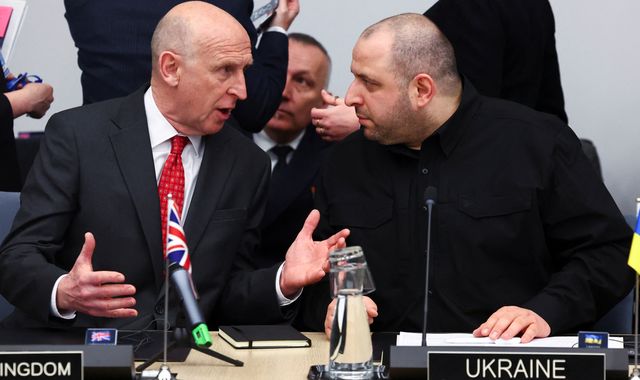
No Writer
Apr 11
Defence secretary warns this is 'the critical year' for Ukraine - as £450m in funding allocated
The funding includes £350m from this year's previously announced pot of £4.5bn in financial support, while the rest of the cash is being provided by Norway via the UK-led International Fund for Ukraine. The money will fund repairs to and maintenance of UK-provided materials and equipment already given to Ukraine, as well as radar systems, anti-tank mines and hundreds of thousands of drones. Follow the latest on the war in Ukraine here It was announced on Friday by Defence Secretary John Healey, who is in Brussels chairing a meeting of the Ukraine Contact Group alongside his German counterpart Boris Pistorius. The group is an alliance of about 50 countries - all 32 NATO member states, including the US, and about 20 other nations - that has been supporting Ukraine by sending military equipment there since April 2022, a few weeks after Russia launched its full-scale invasion. Speaking at the start of the meeting, Mr Healey warned: "2025 is the critical year for the war in Ukraine, and this is the critical moment. "A moment for our defence industries to step up, and they are; a moment for our militaries to step up, and they are; a moment for our governments to step up, and they are. "Together, we are sending a signal to Russia and we are saying to Ukraine that we stand with you in the fight and we will stand with you in the peace." At a news conference following the talks, Mr Healey told journalists that Ukraine's allies have agreed to provide a "record boost" €21bn (£18.2bn) in total of military support for Kyiv. The German defence minister confirmed that US secretary of defence, Pete Hegseth, attended virtually, while special envoy Steve Witkoff travelled to Moscow, which Mr Pistorius insisted was not a matter of "priorities", but of "schedules". 'Coalition of the willing' planning continues The meeting comes one day after the UK defence secretary and his French counterpart Sebastien Lecornu led 30 defence ministers from the "coalition of the willing" in Brussels. The group, which does not include the US, discussed operational plans on Thursday afternoon for a multinational peacekeeping force in Ukraine. It looked at each nation's capabilities and how they could be best used to support Ukraine's long-term defence and security as part of what the Ministry of Defence called a "reassurance force". UK and French military chiefs discussed planning with Ukrainian President Volodymyr Zelenskyy and his military chiefs in Kyiv last weekend. Peace negotiations are ongoing between the US and Russia, however, US officials appear to be growing increasingly impatient with the lack of progress after Donald Trump publicly suggested a month ago that Vladimir Putin wants to end the war. Last Tuesday, the Kremlin described the latest US peace proposal as unacceptable in its current form because it does not solve the "root causes" of the conflict. Read more:Two Chinese citizens 'fighting for Russia' captured in UkraineZelenskyy makes dig at US over response to Russian attack Mr Putin wants to dismantle Ukraine as an independent, functioning state and has demanded Kyiv recognise Moscow's annexation of Crimea and other partly occupied areas and pull its forces out, as well as a pledge for Ukraine to never join NATO and to demilitarise. US secretary of state Marco Rubio said on Friday that Mr Trump is not "going to fall into the trap of endless negotiations" with Moscow. Despite the apparent impasse in talks, the coalition of the willing is continuing with its plans for when peace is agreed.



